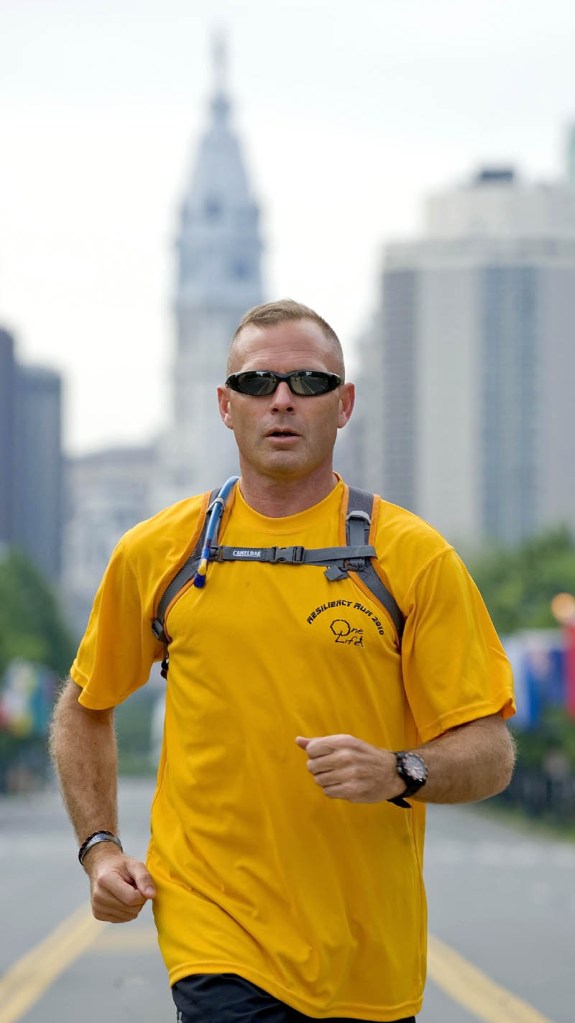WATERVILLE — To prepare for an upcoming 100-kilometer run through a Central American jungle, Col. Jack Mosher follows a simple training regimen.
“I run a lot,” he said with a laugh.
Later this month, the 47-year-old Waterville resident will travel to Panama for his fourth annual Resiliency Run. The event is meant to raise awareness for the difficulties war veterans face upon returning to home. For four days, Mosher will run about 15.5 miles a day through the 300,000-acre Chagres National Park to cover 62 miles. He will scale mountains, traverse boulder fields and ford streams under sweltering tropical heat.
“I like to call it the second deepest and darkest jungle in the world,” he said of Chagres.
The darkest is metaphorical, he said. It is the transition that soldiers endure after deployment.
Mosher has been in the Maine Army National Guard for more than 20 years. From 2003-2004, he served combat duty in Afghanistan.
War might be hell, he said, but returning home is sometimes worse.
When Mosher came home from Afghanistan he was physically and emotionally depleted, he said. Soon after, his marriage fell apart and he was suddenly solely responsible for raising his young children.
“The army doesn’t prepare you to be a single father,” he said. “That required a whole new skill set.”
Other veterans may face similar challenges, he said. And it can take a toll.
“It’s not always a Rockwellian image of family and community that (soldiers) return to,” he said.
In July, an Army veteran in Winslow killed his wife before killing himself. In November, Farmington police shot and killed a veteran who had been discharged from the Army with a diagnosis of post-traumatic stress disorder.
Mosher said those are extreme examples of what can happen when soldiers face their transition without help.
In Mosher’s case, he went through a period of despair, but bounced back after seeking help. He said he hopes other veterans take advantage of wellness programs that are available to them through Veteran’s Affairs and elsewhere.
Mosher acknowledges it’s not easy for veterans to admit they need help. War veterans are, by nature, resilient and independent. In many cases, veterans have been conditioned against seeing help.
“I think the culture of the military teaches us to stick it out, to suck it up. It’s hard for a lot of our warriors to ask for help. Americans in general aren’t great at that,” he said. “If I can do it as an airborne ranger colonel, then they can do likewise.”
Mosher said veterans should also find and participate in physical activities, whether fly fishing, golf or other pursuits.
“Running, for me, was a passion that led me out of the forest,” he said.
The first Resiliency Run was in 2009 when Mosher carried a 25-pound stone in a backpack while competing in the Mount Washington Road Race in New Hampshire. In that race, competitors run 7.6 miles up the auto road of the highest peak east of the Mississippi.
In 2010, Mosher and a fellow veteran ran 13 miles a day for 21 half marathons in 21 days, from Kittery to Arlington, Va. Last year, Mosher joined 13 other veterans took turns running a total of 21 marathons in five days.
This year, he will be joined by fellow veterans during portions of his run in Panama.
Mosher said there’s no end in sight to the annual event.
“I’ll keep doing them until I can’t run anymore, or until it’s no longer needed,” he said.
To learn more about this year’s run or to follow its daily progress, visit onelifewarrior.org or “Resiliency Run” on Facebook.
Ben McCanna — 861-9239
bmccanna@centralmaine.com
Send questions/comments to the editors.




Success. Please wait for the page to reload. If the page does not reload within 5 seconds, please refresh the page.
Enter your email and password to access comments.
Hi, to comment on stories you must . This profile is in addition to your subscription and website login.
Already have a commenting profile? .
Invalid username/password.
Please check your email to confirm and complete your registration.
Only subscribers are eligible to post comments. Please subscribe or login first for digital access. Here’s why.
Use the form below to reset your password. When you've submitted your account email, we will send an email with a reset code.